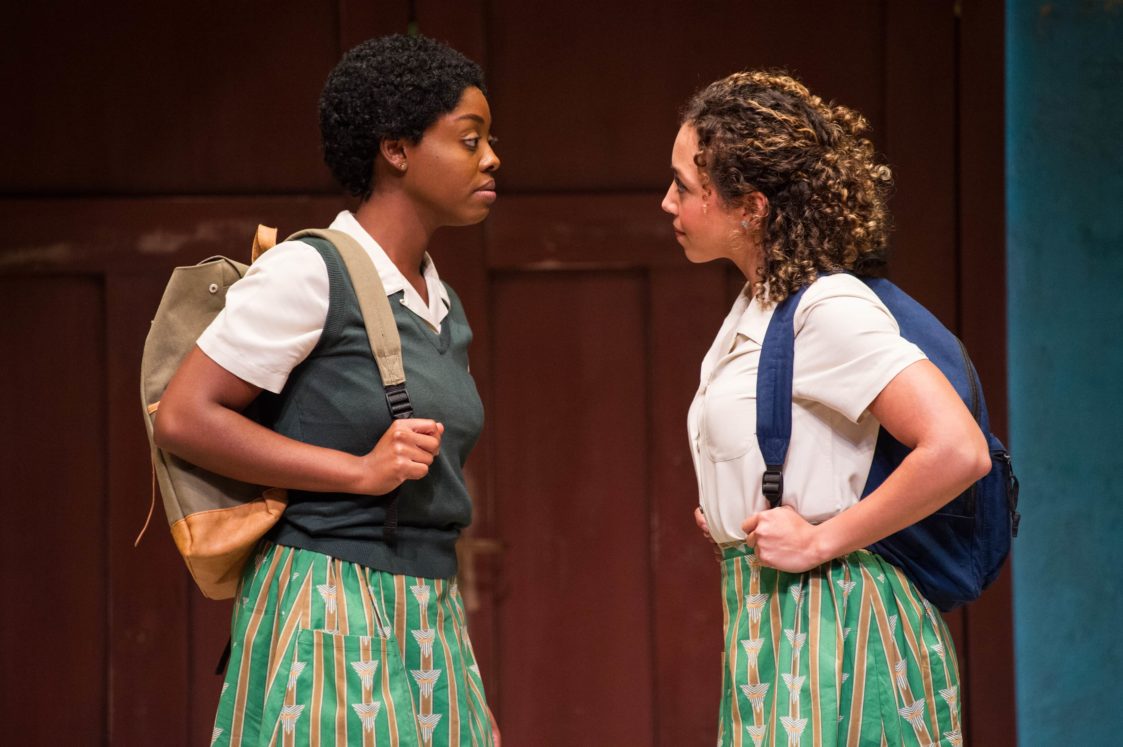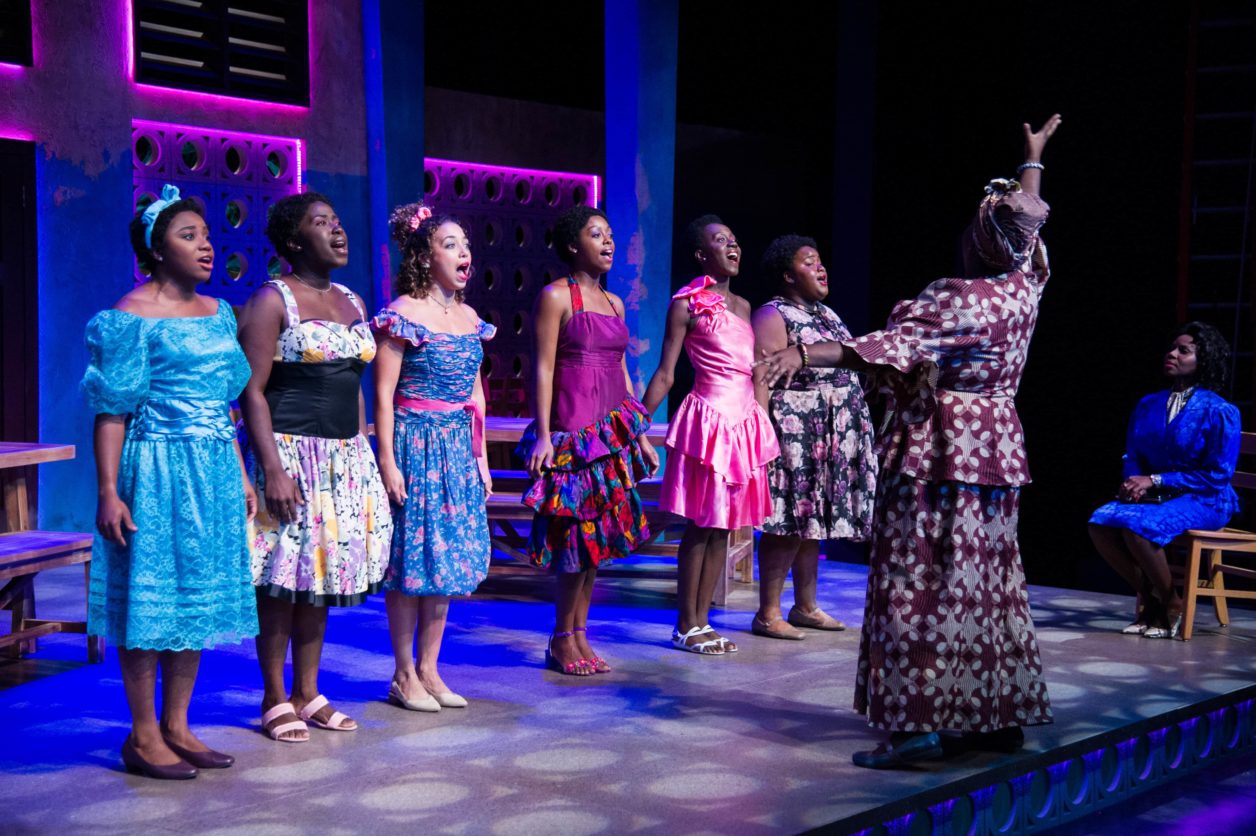Teenage girls can be mean – just ask Broadway’s Tina Fey. But if you ask Jocelyn Bioh, the award-winning playwright of off-Broadway’s School Girls; Or, The African Mean Girls Play, you’ll get an African version that’s a bit more colorful. The beautifully renovated Round House Theatre’s season opener sashays into the world of African teen queens with a comedic briskness that’s funny and charming but also seriously sobering.

An African teen’s world can look very different when notions of attractiveness clash with Western standards of beauty and the insidiousness of colorism. Directed by Nicole A. Watson, Round House Theatre’s Associate Artistic Director, School Girls was inspired by the playwright’s own struggles to find beauty as a dark-skinned American born of Ghanaian immigrants.
Bioh was also influenced by the real-life international firestorm of outrage when Yayra Nego, a light-skinned biracial woman, born and raised in Minneapolis of a Ghanaian father and white American mother, was crowned Miss Universe Ghana 2011. Bioh knew she had to deal with these thought-provoking issues, and her first play as a professional playwright was School Girls; Or, The African Mean Girls Play.
All of the gossipy, girly action in School Girls takes place in the cafeteria, an appealing, bright and airy space with pastel-washed concrete walls, high ceiling fans, and picnic-style tables and benches by Scenic Designer Paige Hathaway.
Paulina (Kashayna Johnson), the self-anointed most popular girl in an exclusive Ghanaian boarding school, is a queen bee who rules her hive of classmate admirers – Gifty (Moriamo Temidayo Akibu), Mercy (Debora Crabbe), Nana (Jade Jones) and Ama (Awa Sal Secka) – with the flick of a wrist.
With the arrival of Ericka (Claire Saunders), a talented and attractive biracial girl from Ohio who is also vying to represent Ghana in the Miss Global Universe 1986 beauty pageant, Paulina is threatened.

Ericka brings goodies from America and exciting new ideas about life in the US and inspires Paulina’s beehive to fight back against her tyranny, particularly Nana whom Paulina fat-shames and blackmails. Nana eventually fights back with, “I am lucky because I will never be you.”
Reaching out to her peers in friendship, Ericka becomes Paulina’s arch-rival making the hive choose sides, and Paulina finally gets her comeuppance when they see her for who she is – a mean girl whose insecurities mask the bravado of a bully.
In the run-up to the beauty contest, a contest recruiter, the imperiously gracious Eloise Amponsah (Shirine Babb) who had been Miss Ghana 1966, arrives at the school to select the girl who would be entered in the pageant.
The girls put on a talent show for Eloise introduced by Headmistress Francis, played by the marvelous Theresa Cunningham who recently played Aunt Sarah in Arena Stage’s Nina Simone’s Four Women with the same kind of tough love.

The talent show is where the hysterically funny characters really show off their best comedic gifts when they individually sing to Whitney Houston’s “The Greatest Love of All.” It’s hilarious as the girls do their best to outdo each other to win over the unscrupulous Eloise. Debora Crabbe as Mercy, the only non-equity member in the cast, is a standout. It’s time for Crabbe to get her membership papers.
Skin bleaching, body shaming, and self-loathing are themes that give School Girls a deeper punch. Paulina is despondent when she gets outed for using bleaching creams and tells light-skinned Ericka, “The world has already decided that you are better than me.”
Bioh’s play is not just about the pratfalls and pitfalls of being a teenage girl struggling for social acceptance. It tiptoes into the universality of all “isms” which judge another based on brittle exterior standards of worthiness. The issues of colorism and vestiges of colonialism that judge dark skin as undesirable should spark a deeper conversation.
The challenge of School Girls, however, is that unless it is seen through a lens that can get past teenagers obsessed with their looks and other superficialities, it is easy to think the show is just about girly girls. Some viewers might miss the meaning that is right beneath the surface: That School Girls is not only comedic entertainment but also sharp criticism of a worldview that teaches women – in Africa as well as the US – to value themselves by the shade of their skin.
Kim James Bey did a great job as Dialect Coach. The cast never slipped but perhaps extended their vowels a little too long, making it hard at times to decipher English with a Ghanaian accent. The costumes in School Girls by Ivania Stack, however, are a gloriously colorful fashion collage of pretty 1980s-inspired dresses that any teenage girl would love to wear.
Youthful high energy and teenage malarkey make School Girls a comedic delight that’s funny but with a serious edge.
Running Time: Approximately 85 minutes.
School Girls; Or, The African Mean Girls Play presented by Round House Theatre, plays through October 20, 2019, 4545 East-West Highway, Bethesda, MD. For tickets, call (240) 644-1100 or go online.




